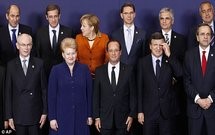 Europe's economic woes are getting worse, so it comes as no surprise that independence movements across the Continent are flaring as central state authorities weaken. As secessionist thinking takes hold in Scotland and Catalonia, London and Madrid are questioning those regions' eventual accession to the European Union, hoping to weaken popular support for independence.
Europe's economic woes are getting worse, so it comes as no surprise that independence movements across the Continent are flaring as central state authorities weaken. As secessionist thinking takes hold in Scotland and Catalonia, London and Madrid are questioning those regions' eventual accession to the European Union, hoping to weaken popular support for independence.
London released a legal opinion Monday stating that an independent Scotland would not automatically be a member of the European Union. This legal opinion is in line with previous statements by the European Commission.
Throughout history, the United Kingdom and Spain have had to deal with demands for autonomy or even independence from the citizens of certain regions. These calls for secession originated in the state-building process, which incorporated different regions and nations under a central government.
In the United Kingdom, nationalism is particularly strong in Northern Ireland, where independence Catholics and loyalist Protestants clash over politics and religion. Scotland joined the Kingdom of England in 1707, giving rise to the United Kingdom of Great Britain. Scotland kept most of its own institutions, but the demand for complete independence has always had a place in Scottish politics. Recently, the distribution of revenue from North Sea oil also became a source of dispute, as Scotland believes it should have a much greater share.
In Spain, mountainous geography has favored the emergence of many populations that evolved in relative isolation. During the mid-20th century, dictator Francisco Franco tried to control the regions by limiting their autonomy and prohibiting regional languages. This generated a violent response in many regions, including Basque terrorism, represented by Euskadi Ta Askatasuna and other militant organizations.
The United Kingdom and Spain tried to solve secessionist conflicts through the devolution of powers. In 1998, the Good Friday Agreement led to the creation of the Northern Ireland Assembly. Although tensions between Catholic and Protestant groups persist, violence has since declined substantially. Scottish claims for greater self-determination reached a milestone in 1998, when a separate Scottish Parliament convened for the first time in almost 300 years. With the restoration of democracy in the late 1970s, Spain built a delicate constitutional balance by granting the Spanish regions varying degrees of autonomy.
The current demand for independence in Scotland is the result of a slow political process that began a decade ago. The pro-independence Scottish National Party had a relatively high base of support in the 2000s, but had been traditionally left out of government coalitions. The party celebrated a landslide victory in 2011 (winning 45.4 percent of votes) in the context of the economic crisis and the erosion in support of traditional political parties.
In Spain, the current independence movement began as a dispute over taxes collected in Catalonia. This traditionally wealthy region claims that it would be better off if it had control over its own financial resources instead of sharing the burden with less developed regions.
Despite its recent popularity, secession is a controversial issue in Scotland and Catalonia. Public opinion is still divided on the topic. The independence movements themselves are far from forming a cohesive body, with different factions debating the economic and political form an eventual sovereign state should have. British Prime Minister David Cameron and Spanish Prime Minister Mariano Rajoy are shaping their strategies with this in mind. Cameron agreed with the Scottish government to hold an independence referendum in 2014. His strategy is not to confront the Scottish population, but to focus his campaign on the benefits of being a part of the United Kingdom. Cameron argues, among other things, that Scotland would struggle to fund its own military and welfare services.
In Spain, the situation is more complex because the Spanish constitution explicitly forbids secession. Furthermore, Madrid is under strong pressure from Brussels and the international markets to maintain financial and political control of the autonomous regions, which are seen as being partially responsible for the crisis. In recent weeks, Rajoy sought to tone down the dispute with Catalonia. His strategy is to let the divisions within the independence movement, and the Catalan business community's fear of losing access to the European Union, weaken support for independence. If this strategy fails, Madrid will have to turn to the Spanish Supreme Court.
For both leaders, membership in the European Union is a crucial weapon in the struggle to keep their countries united. Scotland and Catalonia want to be part of the common market, but would lose their EU membership if they won independence. London and Madrid could veto Scotland and Catalonia's access to the European Union if they became independent.
Cameron is pursuing the strategy of focusing on the benefits of EU membership even as his government is pushing to renegotiate the United Kingdom's status in the European Union, going so far as to threaten to leave the bloc. Rajoy has recently criticized Germany's leadership during the crisis, demanding that Berlin do more to assist countries in the European periphery. This reveals an irony within the European crisis: Despite its visible problems, the European Union remains an attractive target for some governments, and the benefits or costs of EU membership can be manipulated according to political convenience.
Courtesy : Stratfor (www.stratfor.com)